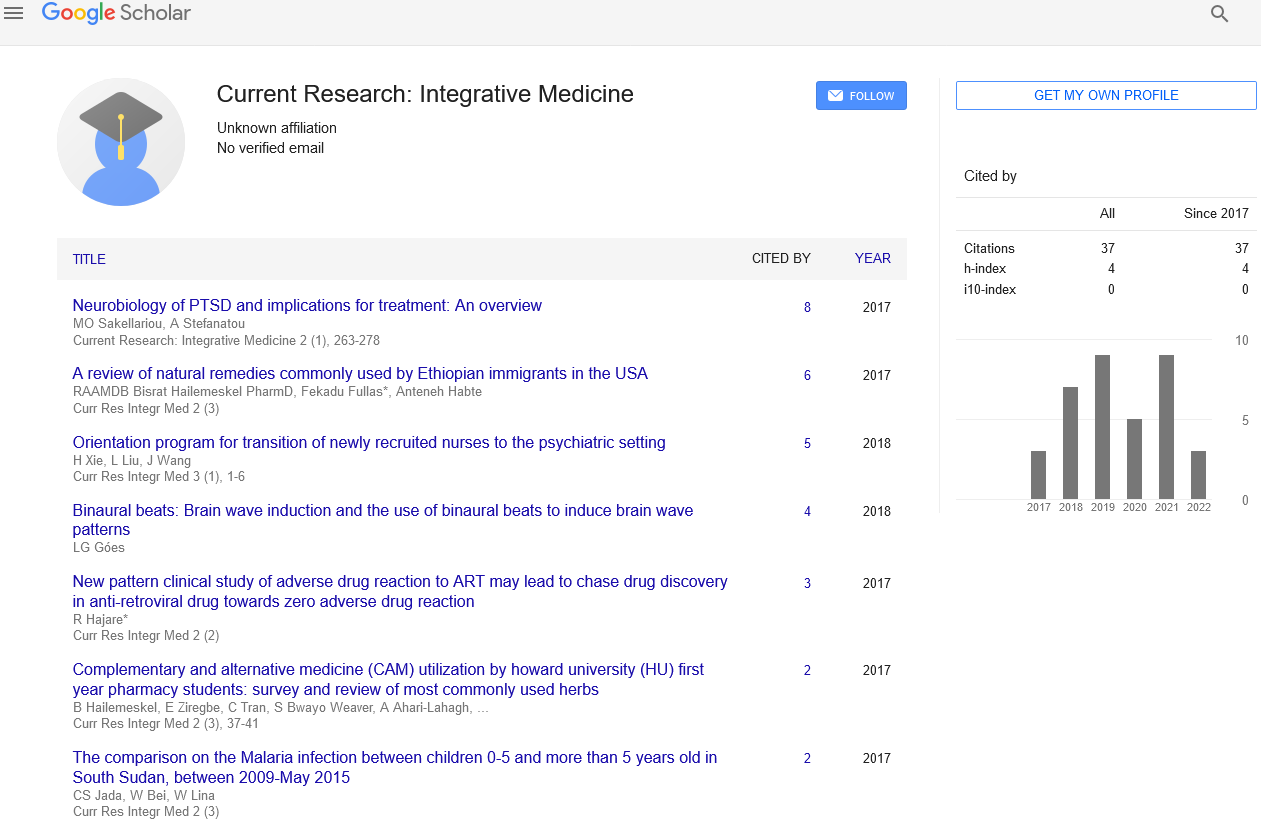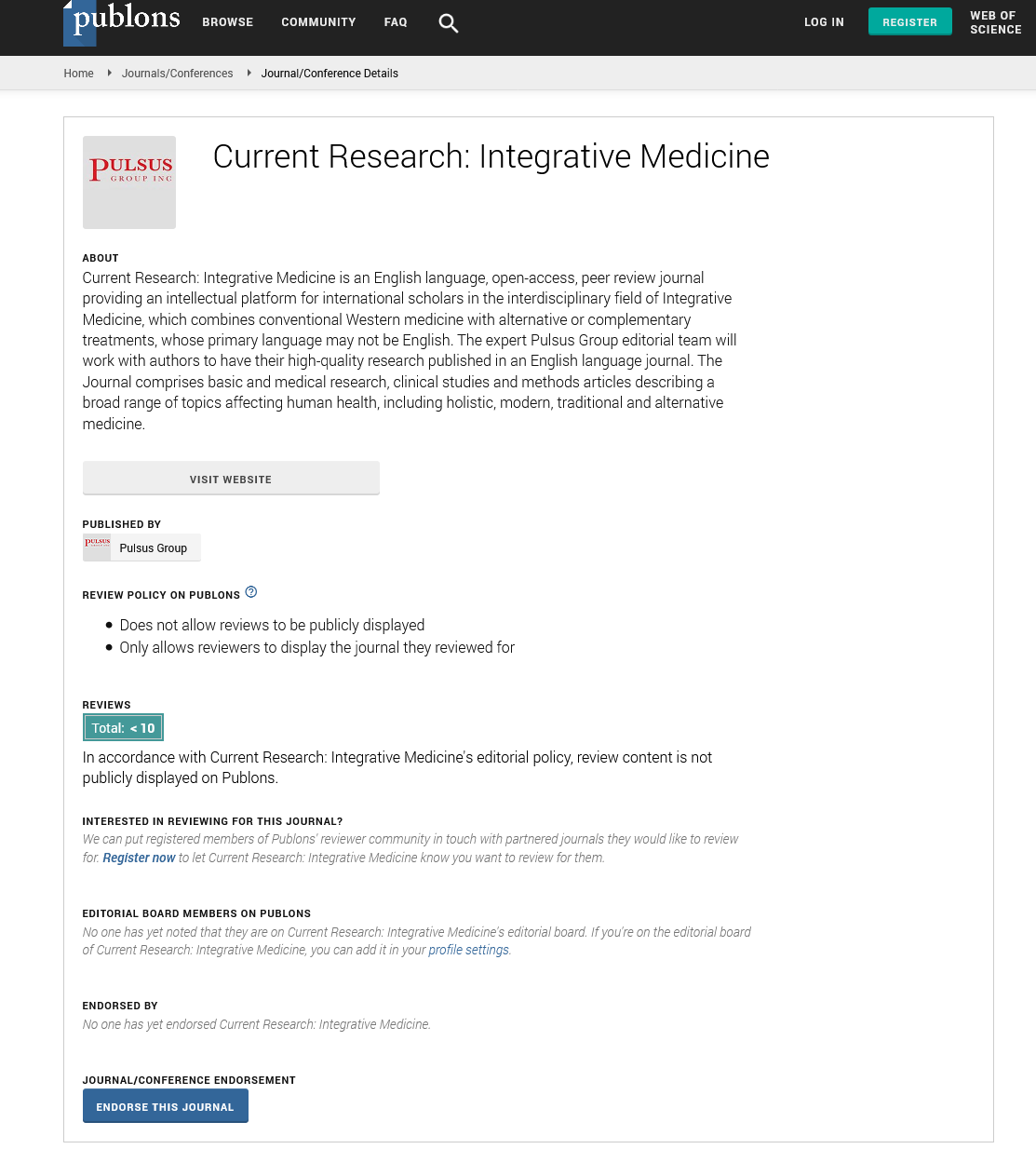Embracing naturopathy: A holistic approach to health and wellness
Received: 23-Jul-2024, Manuscript No. pulcrim-24-7124; Editor assigned: 25-Jul-2024, Pre QC No. pulcrim-24-7124(PQ); Reviewed: 31-Jul-2024 QC No. pulcrim-24-7124(Q); Revised: 03-Aug-2024, Manuscript No. pulcrim-24-7124(R); Published: 10-Aug-2024
This open-access article is distributed under the terms of the Creative Commons Attribution Non-Commercial License (CC BY-NC) (http://creativecommons.org/licenses/by-nc/4.0/), which permits reuse, distribution and reproduction of the article, provided that the original work is properly cited and the reuse is restricted to noncommercial purposes. For commercial reuse, contact reprints@pulsus.com
Abstract
Naturopathy is a holistic medical system that emphasizes the natural healing power of the body. Integrating various traditional and modern therapeutic practices, it focuses on promoting health and preventing disease through natural means. This article explores the principles of naturopathy, its historical background, core modalities, and its growing relevance in modern healthcare. By fostering a comprehensive understanding of naturopathy, individuals can make informed decisions about their health and well-being.
Key Words
Naturopathy; Holistic health; Natural healing; Preventive medicine; Integrative therapy
Introduction
In an era where modern medicine is often dominated by pharmaceuticals and invasive procedures, sa growing number of individuals are turning towards alternative therapies that emphasize natural healing. Naturopathy, a system of healthcare that promotes the body’s self-healing process, has emerged as a prominent approach in this shift. Rooted in ancient healing traditions and supported by contemporary scientific understanding, naturopathy offers a holistic approach to health and wellness. This article delves into the fundamentals of naturopathy, its therapeutic practices, and its significance in today’s health landscape.
Historical background
Naturopathy, as a distinct system of healing, traces its origins to the late 19th and early 20th centuries. Influenced by various traditional medical practices, including European nature cure, herbalism, and Eastern medical philosophies, naturopathy was formally established by practitioners like Benedict Lust and Henry Lindlahr. These pioneers emphasized the importance of natural elements, such as water, air, sunlight, and nutrition, in the healing process. Over time, naturopathy evolved to incorporate a diverse array of treatments, merging ancient wisdom with modern scientific insights.
Core principles of naturopathy
At the heart of naturopathy are six fundamental principles that guide its practice:
The Healing Power of Nature (Vis Medicatrix Naturae): Naturopathy believes in the inherent self-healing process of the body. Practitioners aim to support and enhance this natural process rather than suppress symptoms.
Identify and treat the cause (Tolle Causam): Naturopathy focuses on identifying and addressing the root cause of illness, rather than merely alleviating symptoms. This approach often involves a comprehensive assessment of lifestyle, diet, and environmental factors.
First do no harm (Primum Non Nocere): Naturopathic treatments are designed to be safe and non-invasive, minimizing the risk of harmful side effects. The emphasis is on gentle, natural interventions that support the body's healing mechanisms.
Doctor as teacher (Docere): Education is a key component of naturopathy. Practitioners empower patients with knowledge about their health, encouraging active participation in their healing journey.
Treat the whole person: Naturopathy considers the interconnectedness of the body, mind, and spirit. Treatment plans are tailored to address all aspects of an individual's well-being.
Prevention: Preventive care is a cornerstone of naturopathy. By promoting healthy lifestyle choices and proactive measures, naturopathy aims to prevent illness before it occurs.
Core modalities of naturopathy
Naturopathy employs a wide range of therapies and treatments, often tailored to the unique needs of each patient. Key modalities include:
Clinical nutrition: Emphasizing the role of diet in health, naturopathy utilizes nutritional counseling and dietary modifications to promote healing and prevent disease. This includes the use of whole foods, supplements, and dietary plans tailored to individual needs.
Herbal medicine: Drawing on the medicinal properties of plants, herbal medicine is a cornerstone of naturopathic practice. Herbs are used to support various bodily functions, enhance immunity, and address specific health concerns.
Hydrotherapy: The therapeutic use of water in various forms (such as baths, compresses, and steam) is employed to stimulate circulation, detoxify the body, and promote relaxation and healing.
Physical medicine: This includes a range of manual therapies, such as massage, spinal manipulation, and exercise therapy, aimed at improving physical function and alleviating pain.
Homeopathy: Based on the principle of "like cures like," homeopathy uses highly diluted substances to stimulate the body's healing response. It is often used to treat chronic conditions and support overall wellness.
Lifestyle and behavioral counseling: Recognizing the impact of lifestyle and mental health on physical well-being, naturopathy incorporates counseling and stress management techniques to support emotional and psychological health.
The role of naturopathy in modern healthcare
Naturopathy is gaining recognition and acceptance within the broader healthcare landscape. As individuals seek more personalized and preventive approaches to health, naturopathy offers a viable complement to conventional medicine. Integrative healthcare models, which combine conventional and alternative therapies, are becoming increasingly common. Naturopathy's emphasis on holistic care, patient education, and preventive measures aligns well with contemporary health trends.
Research supporting the efficacy of naturopathic treatments is growing, with studies highlighting the benefits of dietary interventions, herbal medicine, and mind-body therapies. Additionally, naturopathy's focus on individualized care and minimal side effects makes it an attractive option for those seeking a more natural and patient-centered approach to health.
Conclusion
Naturopathy represents a holistic and integrative approach to health and wellness, grounded in the belief in the body’s innate ability to heal itself. By combining traditional healing practices with modern scientific understanding, naturopathy offers a comprehensive and personalized approach to healthcare. As the demand for natural and preventive health strategies continues to rise, naturopathy stands poised to play a significant role in shaping the future of medicine. Embracing naturopathy can empower individuals to take charge of their health, fostering a balanced and vibrant life.






